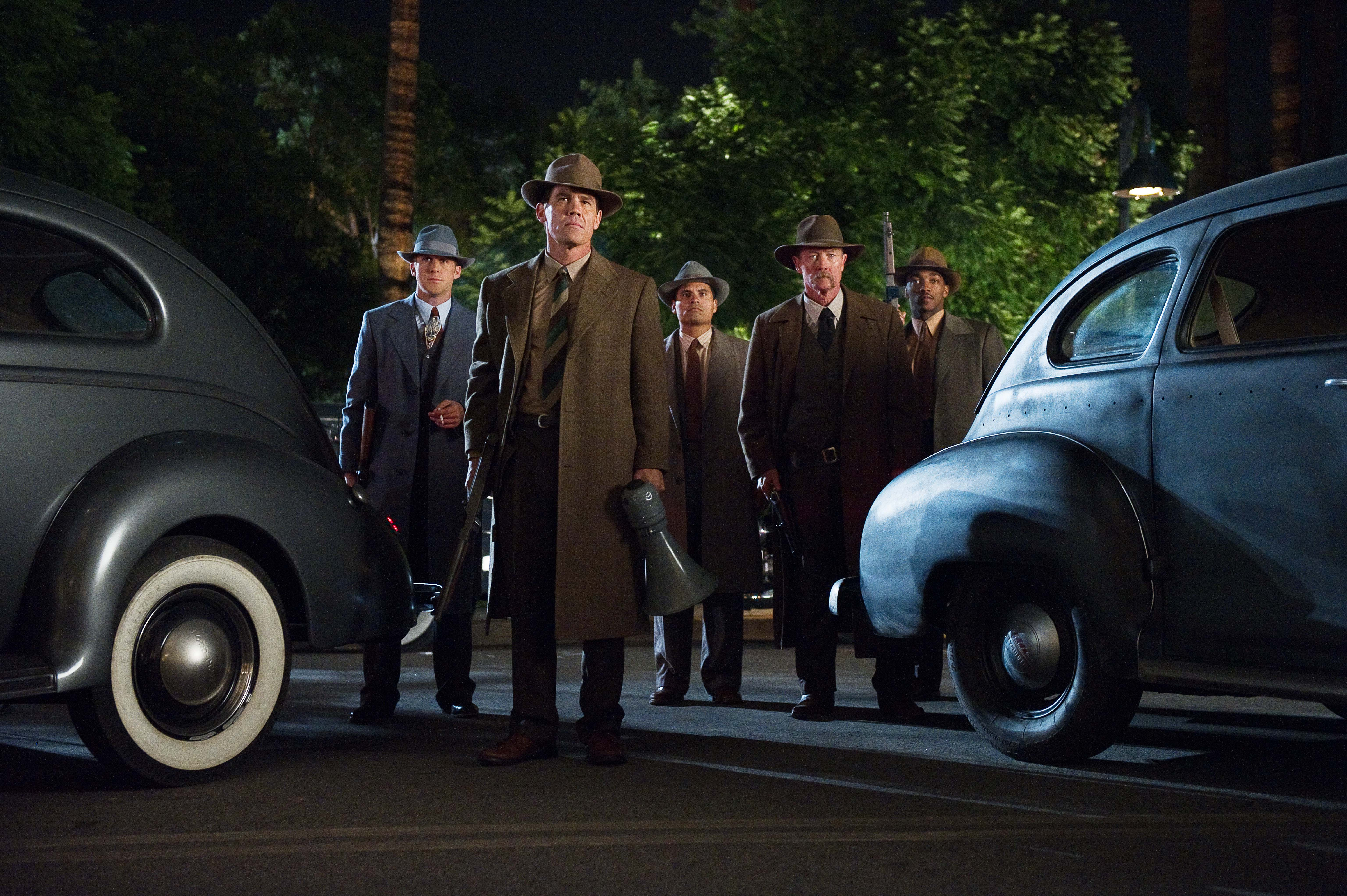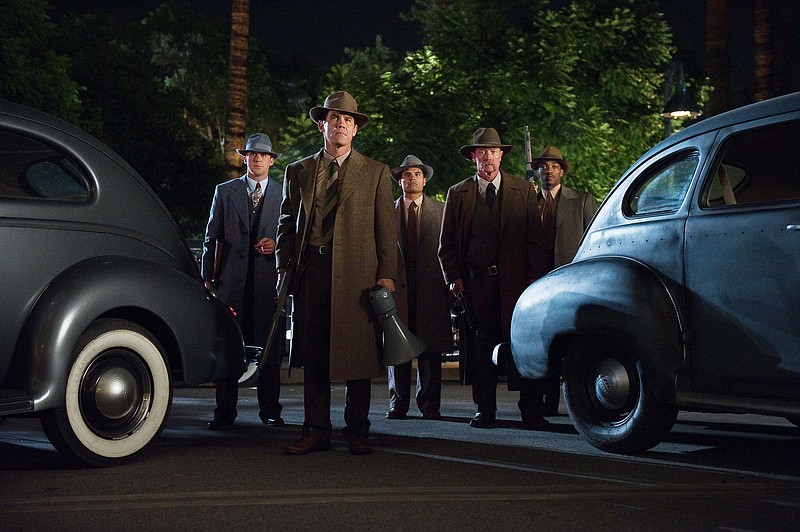 This undated publicity photo released by Warner Bros. Pictures shows, from left, Ryan Gosling as Sgt. Jerry Wooters, Josh Broslin, as Sgt. John O'Mara, Michael Pena, as Officer Navidad Ramirez, Robert Patrick, as Officer Max Kennard, and Anthony Mackie, as Officer Coleman Harris, in Warner Bros. Pictures' and Village Roadshow Pictures' drama, "Gangster Squad," a Warner Bros. Pictures release. To bring the story of mobster Mickey Cohen's reign over post-war Los Angeles to life, the director of "Gangster Squad" employed Sean Penn, Josh Brolin, Ryan Gosling and more than 100 irreplaceable vintage American cars. (AP Photo/Warner Bros. Pictures, Wilson Webb)
This undated publicity photo released by Warner Bros. Pictures shows, from left, Ryan Gosling as Sgt. Jerry Wooters, Josh Broslin, as Sgt. John O'Mara, Michael Pena, as Officer Navidad Ramirez, Robert Patrick, as Officer Max Kennard, and Anthony Mackie, as Officer Coleman Harris, in Warner Bros. Pictures' and Village Roadshow Pictures' drama, "Gangster Squad," a Warner Bros. Pictures release. To bring the story of mobster Mickey Cohen's reign over post-war Los Angeles to life, the director of "Gangster Squad" employed Sean Penn, Josh Brolin, Ryan Gosling and more than 100 irreplaceable vintage American cars. (AP Photo/Warner Bros. Pictures, Wilson Webb)Wesley Morris
Sean Penn plays a gangster whose moll, played by Emma Stone, flirts with Ryan Gosling's police officer.
Sean Penn (above) plays a gangster whose moll, played by Emma Stone, flirts with Ryan Gosling's police officer.
''Gangster Squad" is an almost movie. It's almost terrible. It's almost entertaining. But it's missing the shameless insanity of a wonderfully bad movie, and the particular vision, point of view, and coherence of some very good ones. So it sits there in between -- loud, flashy, and unnecessary.
It's almost like every popular movie about crooks and cops made in the last four decades, but never enough like its own movie. An extended gunfight mimics the famous train-station staircase shootout in "The Untouchables." But mimic is all it does. A lot of people who'll see "Gangster Squad" will also have seen "The Untouchables." So they'll watch Josh Brolin and Ryan Gosling as cops blasting their guns and sliding across marble floors and know it was better in Brian De Palma's movie. That's because De Palma didn't carve up the space the way Ruben Fleischer has with "Gangster Squad."
They'll see whatever Sean Penn is going for as Mickey Cohen, the real-life East Coast criminal who tries to take over the Los Angeles underworld in 1949, and miss Al Pacino's Tony Montana or Robert De Niro's Al Capone. Penn spews like a boiling radiator, which is much closer to Pacino's Big Boy Caprice in Warren Beatty's "Dick Tracy." But Big Boy Caprice was a work of Pop Art -- a Roy Lichtenstein of Tony Montana.
That is to say that "Gangster Squad" inadequately substitutes for what you could be watching instead. The film has been inspired by a seven-part series of articles Paul Lieberman wrote for the Los Angeles Times in 2008 that detailed the Police Department's struggle against organized crime, in part as a war between Cohen and a secret team of LAPD officers called the Gangster Squad. The movie boils down the articles' scope and sense of place to a lot of bright, flashy set pieces that never feel like a specific location. Will Beall's script replaces texture and context with gangster-movie clichÃ5/8s. A sweeping, surprising story about a besieged city too often turns into generic demolition and pre-chewed peril. "L.A. Confidential" becomes a video game.
''L.A. Confidential" was itself about the movies, but quietly. Its source material -- James Ellroy's novel -- situated police corruption within a socially festering Los Angeles. This movie doesn't really connect to the world around it. You never believe that it's 1949. Brolin plays the captain of the Gangster Squad, but he's a supersoldier who dispatches baddies as if he were starring in a Jason Statham movie. Brolin is too interesting an actor for such a square-jaw part. He's got the right beefiness, but there's nothing for him to play but the single-minded relentlessness required to put Cohen out of business. His best scenes involve him being lovingly out-thought by his very pregnant and therefore very victimizable wife (Mireille Enos) -- they humanize him.
Elsewhere, you watch Gosling, as a dapper cop, flirt with Emma Stone, as Cohen's miserable moll, and some of their dialogue has an old-Hollywood gleam. But it just feels like dress-up. Gosling and Stone are two of my favorite reasons to go to the movies, but their 21st-century modernity can't fill in the shadows of this noirish world. The movie also has parts for Anthony Mackie, Michael PeÃa, Giovanni Ribisi, and Robert Patrick. Along with Brolin and Gosling, they complete the squad, and they're fun to watch together. They're also the A-Team.
WILSON WEBB/WARNER BROS. PICTURES
Sean Penn's moll, played by Emma Stone, flirts with Ryan Gosling's police officer.
Sean Penn's moll, played by Emma Stone, flirts with Ryan Gosling's police officer.
And Fleischer appears to have left them all to figure out how to stay in the same movie. He's more interested in staging those shootouts and fights -- in spending the studio's money. He gets to use bigger set pieces than in his previous movies (the comedies "Zombieland" and "30 Minutes or Less") and a wider Nick Nolte as the chief of police. It's just unclear what he wants this movie to be. It's not trashy. It's not quite serious. It's not enough fun. And a bloody, awkwardly staged brawl between Brolin and Penn is like the "Milk" rematch no one with decorum would dare ask for.
Penn can't season the surrounding blandness. His face is made up to be both tight and creased. His nose is swollen, his eyes beady, his mouth somehow beadier. The movie wants us to know how muscled Penn's Cohen is; it opens with his big arms rippling in the slowest motion as he socks a punching bag. It's meant to demonstrate strength, but it's just grotesque.
Penn's physique is to be admired more than feared or desired. He doesn't provide menace or heat or sex. And the role doesn't have enough going on for him to rise to the iconic, unembarrassed brazenness of Pacino in "Scarface." Rather, it brings him low. The movie's been lighted and colored so that whenever Penn does anything, he actually looks like something "The Polar Express" digitized. Everybody in "Gangster Squad" is like this. They're almost human.
